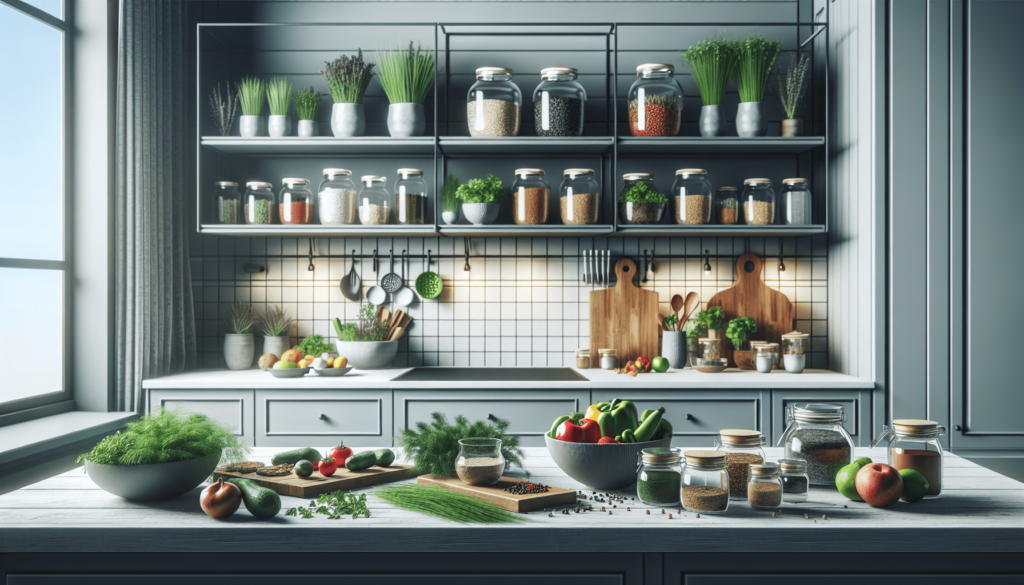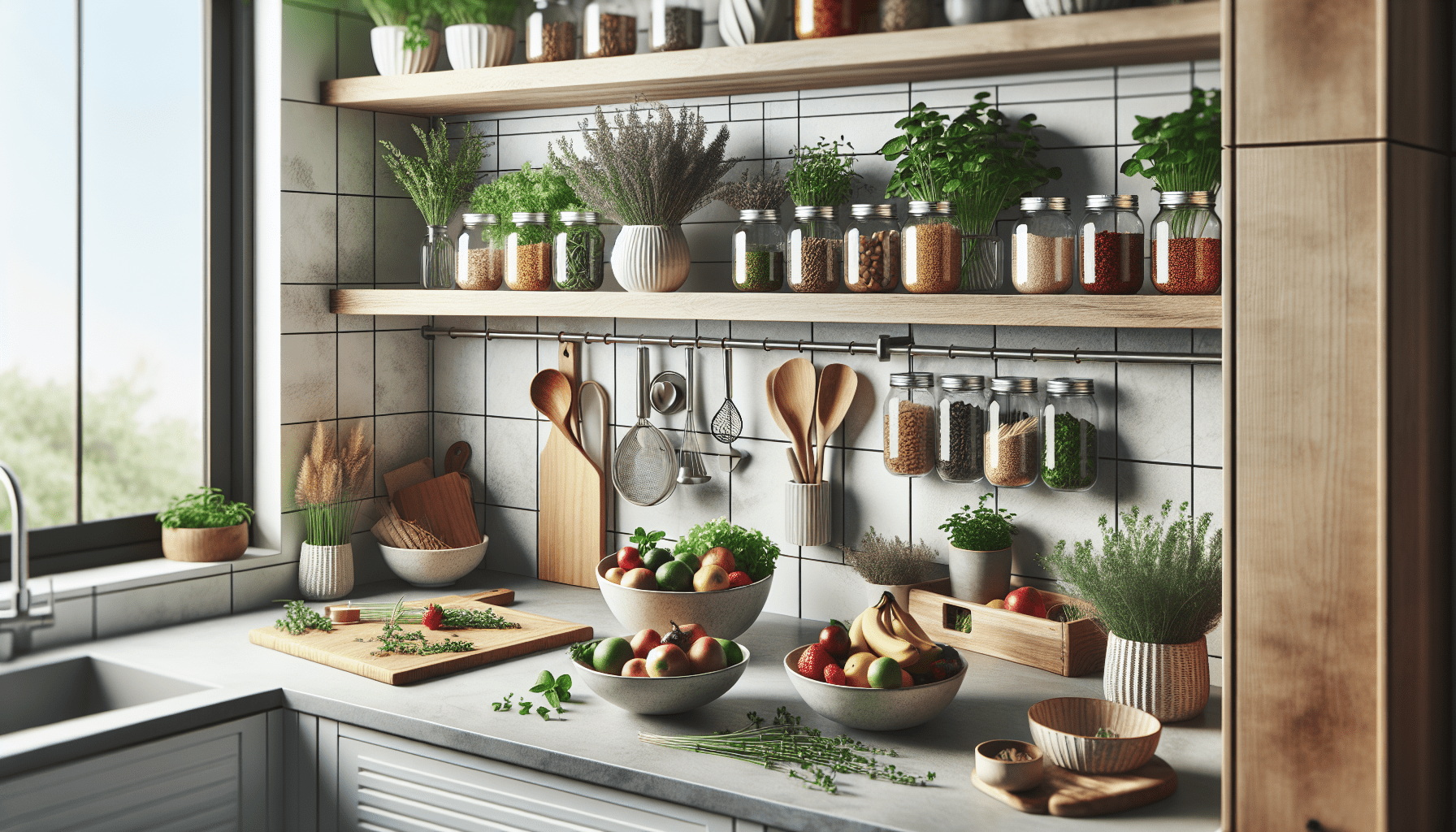Welcome to your journey of creating a holistic kitchen! In this article, we will explore practical tips and tricks to help you transform your kitchen into a space that promotes physical, mental, and emotional well-being. From stocking up on wholesome ingredients to incorporating mindfulness practices into your cooking routine, we will guide you through the process of creating a balanced and harmonious kitchen environment that nourishes your body and soul. Let’s begin this exciting culinary adventure together! Have you ever wanted to transform your kitchen into a place that promotes health, wellness, and sustainability? Creating a holistic kitchen goes beyond just the food you cook – it involves the design, organization, and mindset you bring into the heart of your home. Here are some tips and tricks to help you create a holistic kitchen that nourishes your body, mind, and soul.
The Basics of a Holistic Kitchen
When it comes to creating a holistic kitchen, it’s essential to start with the basics. This means focusing on using natural, whole foods, incorporating sustainable practices, and creating a calming environment that promotes mindfulness and well-being. By following these simple guidelines, you can transform your kitchen into a space that supports your overall health and happiness.
Choosing Whole Foods
One of the first steps in creating a holistic kitchen is to focus on using whole, unprocessed foods. This means choosing fresh fruits and vegetables, whole grains, lean proteins, and healthy fats over pre-packaged, processed foods that are loaded with additives and preservatives. By incorporating more whole foods into your diet, you can increase your intake of essential nutrients, fiber, and antioxidants, which are essential for overall health and well-being.
Embracing Sustainable Practices
Creating a holistic kitchen also involves embracing sustainable practices that support the health of the planet. This includes choosing organic produce whenever possible, buying locally sourced ingredients, and reducing food waste by composting leftovers or repurposing ingredients. By making these small changes in your kitchen, you can reduce your environmental footprint and support a healthier, more sustainable food system.
Creating a Calming Environment
In addition to focusing on the foods you cook, creating a holistic kitchen also involves designing a space that promotes relaxation and mindfulness. This can be achieved by decluttering your kitchen, organizing your pantry and cabinets, and incorporating natural elements like plants and herbs into your decor. By creating a calming environment in your kitchen, you can reduce stress, improve your mood, and foster a sense of well-being while preparing meals.
Designing Your Holistic Kitchen
The design of your kitchen plays a significant role in creating a holistic space that supports health and wellness. From the layout and organization of your cabinets to the colors and materials you choose for your countertops, every aspect of your kitchen design can impact your overall well-being. Here are some tips for designing a holistic kitchen that nourishes your body, mind, and spirit.
Layout and Organization
When designing a holistic kitchen, it’s essential to consider the layout and organization of your space. This includes creating a functional workspace that allows you to move freely while cooking, as well as organizing your cabinets and pantry in a way that promotes efficiency and ease of access. By optimizing the layout and organization of your kitchen, you can make meal preparation more enjoyable and stress-free.
Colors and Materials
The colors and materials you choose for your kitchen can also have a significant impact on the overall atmosphere and energy of the space. When creating a holistic kitchen, it’s best to opt for natural, earthy tones like greens, browns, and neutrals, as these colors promote a sense of calm and balance. Additionally, choosing sustainable materials like bamboo, reclaimed wood, and recycled glass can help reduce your environmental impact and create a more eco-friendly kitchen.
Lighting and Ventilation
Proper lighting and ventilation are essential components of a holistic kitchen design. Natural light can boost your mood, improve your energy levels, and enhance the overall ambiance of your space. When possible, try to maximize the amount of natural light in your kitchen by installing larger windows or skylights. Additionally, investing in a high-quality range hood or ventilation system can help remove odors, gases, and pollutants from the air, creating a healthier environment for cooking and dining.

Stocking Your Holistic Kitchen
Once you have established the basics and designed your holistic kitchen, it’s time to stock your pantry, refrigerator, and cabinets with ingredients that promote health and wellness. By keeping a well-stocked kitchen full of nourishing foods, herbs, and spices, you can make it easier to prepare nutritious meals that support your overall well-being. Here are some essential items to have in your holistic kitchen:
| Pantry Staples | Refrigerator Essentials | Spice Cabinet Must-Haves |
|---|---|---|
| Whole grains (quinoa, brown rice, oats) | Fresh fruits and vegetables | Turmeric |
| Legumes (beans, lentils) | Lean proteins (chicken, fish, tofu) | Cinnamon |
| Nuts and seeds | Dairy or dairy alternatives | Ginger |
| Healthy fats (olive oil, coconut oil) | Eggs | Garlic |
| Dried herbs and spices | Leafy greens | Cumin |
| Natural sweeteners (honey, maple syrup) | Yogurt or kefir | Basil |
By keeping these pantry staples, refrigerator essentials, and spice cabinet must-haves on hand, you can ensure that you always have the ingredients you need to create healthy and delicious meals that nourish your body and support your holistic lifestyle.
Cooking Tips and Techniques
In addition to stocking your kitchen with wholesome ingredients, it’s essential to have the skills and knowledge to prepare healthy meals that promote well-being. By incorporating cooking techniques that maximize nutrient retention and flavor, you can create delicious and nutritious dishes that support your holistic lifestyle. Here are some cooking tips and techniques to help you make the most of your holistic kitchen:
Cooking Methods
When it comes to cooking in a holistic kitchen, it’s best to choose methods that preserve the natural flavors and nutrients of your ingredients. This includes techniques like steaming, roasting, grilling, and sautéing, which help retain the integrity of your food while enhancing its taste and texture. By experimenting with different cooking methods, you can discover new ways to prepare your favorite foods that are both healthy and delicious.
Meal Planning and Prep
Meal planning and prep are essential components of a holistic kitchen that make it easier to stick to a healthy eating routine. By taking the time to plan your meals in advance, create a shopping list, and prepare ingredients ahead of time, you can ensure that you always have nutritious options available when hunger strikes. Additionally, batch cooking and meal prepping on weekends can save you time and energy during the week, making it easier to make healthier choices when you’re short on time.
Mindful Eating
In a holistic kitchen, it’s not just about what you eat – it’s also about how you eat. Practicing mindful eating can help you savor your food, improve digestion, and cultivate a greater sense of gratitude for the nourishment you receive. This means eating slowly, chewing your food thoroughly, and paying attention to the flavors, textures, and aromas of your meals. By incorporating mindfulness into your eating habits, you can enhance your overall dining experience and enjoy greater satisfaction from your meals.

The Importance of Sustainability
Creating a holistic kitchen isn’t just about nourishing your body – it’s also about nurturing the planet. Sustainability is a key principle of holistic living that involves making choices that support the health of the environment, as well as your own health and well-being. By adopting sustainable practices in your kitchen, you can reduce waste, conserve resources, and promote a more sustainable food system for future generations.
Reduce Food Waste
One of the simplest ways to promote sustainability in your kitchen is by reducing food waste. This can be done by planning meals in advance, using up leftovers, composting food scraps, and repurposing ingredients to minimize waste. By being mindful of the food you buy, cook, and consume, you can help reduce the amount of food that ends up in landfills and contribute to a more sustainable food system.
Choose Sustainable Ingredients
Another way to support sustainability in your holistic kitchen is by choosing ingredients that are produced in an environmentally friendly manner. This includes opting for organic produce, grass-fed meats, sustainably sourced seafood, and Fair Trade products that support ethical labor practices. By supporting sustainable agriculture and fair trade practices, you can help protect the environment, support local farmers, and promote social responsibility in the food industry.
Eco-Friendly Practices
In addition to choosing sustainable ingredients, there are other eco-friendly practices you can incorporate into your holistic kitchen to reduce your environmental impact. This includes using energy-efficient appliances, investing in reusable kitchen essentials like stainless steel straws and glass containers, and avoiding single-use plastic products whenever possible. By making small changes in your daily routine, you can reduce your carbon footprint and create a more sustainable kitchen that aligns with your holistic lifestyle.
Bringing It All Together
Creating a holistic kitchen is a journey that involves making conscious choices about the foods you eat, the way you cook, and the environment you create in your home. By focusing on using whole foods, embracing sustainable practices, designing a calming space, and prioritizing your health and well-being, you can transform your kitchen into a place that supports your holistic lifestyle. Whether you’re an experienced chef or a novice in the kitchen, these tips and tricks can help you create a space that nourishes your body, mind, and soul, one meal at a time.

